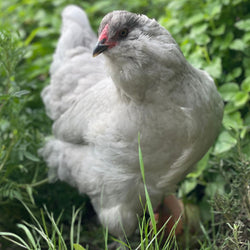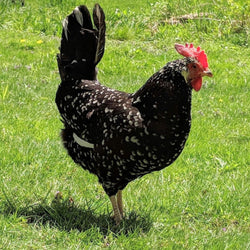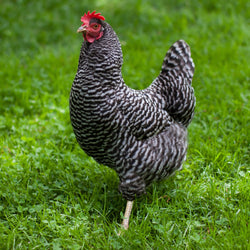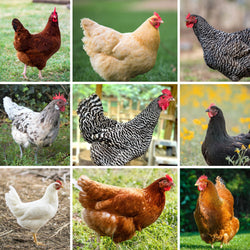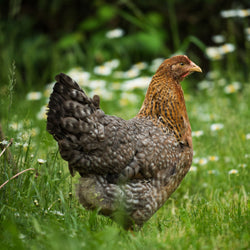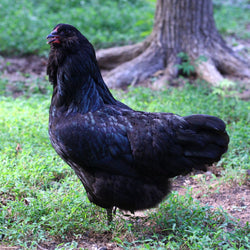page=10/--
Frequently Asked Questions
Here we answer the most commonly-asked questions about ordering, chicken care, and more.
Are there any special secrets to help my chickens stay warm in the winter?
Secrets? No. Tricks? A few, maybe. First of all, take a few moments to review the 8 things you SHOULDN'T do for your chickens in cold weather. You can read some more in the "related questions" below, too. (Here is a hen happily foraging in below-freezing temps!) You'd be surprised at how well chickens do in the cold when allowed to acclimate over time, with the changing seasons. That said, if you live in the mountains of Vermont or Colorado, or in bitter Minnesota or North Dakota where temps are regularly in the single digits, some folks like to help...
Read MoreAll about Lymphoid Leukosis (Avian Leukosis) disease
All about Lymphoid Leukosis (Avian Leukosis) disease|caLymphoid Leukosis is a tragic disease that affects a chicken's liver and can cause a painful death. Because of that, humane euthanasia is usually recommended to ease the suffering of poor birds that contract this illness and to help prevent the spread of the disease to other members of the flock. You'll definitely want to consult with a veterinarian if you suspect a member of your flock has this disease. Read on to find out more: Lymphoid Leucosis Also called Liver cancer, Liver disease, LL Prevalence Common Signs General signs - Fatigue, weakness, ruffled...
Read MoreWill a broody hen starve herself to death on the nest?
It's unlikely she'll starve, but even so, it's not unheard of for a hen to die on the nest. Remember, even when they're broody, they do get off the nest to eat and drink (often this happens at night, when you may not see it). After all, it wouldn't do momma hen or her chicks-to-be any good if she starves herself to death. But her instincts are designed so that she gets broody for about 21 days, the amount of time it takes for her eggs to hatch. However, in a backyard setting, her eggs may not even be fertile---or...
Read MoreAll about Ascites disease
If your bird has a large, reddish, swollen belly and but otherwise looks bluish, along with having respiratory issues like a cough, it's possible she has Ascites. Finding out the exact cause of the issue and the correct treatment will require the assistance of a qualified veterinarian. In many cases, providing a healthy environment for your flock can help protect them from ascites, so make sure you're doing that! Read on to find out more: Ascites Also called Pulmonary hypertension syndrome, waterbelly, fluid retained in abdomen Prevalence Uncommon, more common in meat-type breeds and varieties Signs General signs - Lethargy,...
Read MoreMy chick's toes are all curled up--what's wrong with her?
Sometimes a chick will develop or hatch with a condition called curled toes or curly toes in one or both feet. Illustration for My Pet Chicken by Ray Yang It's possible that she has injured a foot--sometimes this can occur while she's in the egg as she's trying to position herself correctly for hatching. Sometimes the injury might occur after she's hatched. It can also be that she's suffering from a riboflavin deficiency, either from a deficient diet in the hen that laid her egg, or because she is not consuming enough herself. Another possibility, especially with at-home artificial incubation,...
Read MoreHow long do I have to keep my chicken quarantined after treating for an illness or infection?
There is not a single answer to that question--it will depend on what your bird has been treated for. For instance, once you've treated for mites and your bird is no longer infested, it's safe to end the quarantine immediately. However, other illnesses like Coryza, even when the bird has recovered s/he may remain symptom-less carrier... a Typhoid Mary for your flock. Other illnesses may fall somewhere in between, with birds remaining infectious for some period of time but not forever. So when you consult with a veterinarian, make sure to ask this key question about your bird's particular diagnosis....
Read MoreCan't I just mix my own chicken feed at home?
Yes, you CAN mix your feed at home. But that said, it's not very easy or inexpensive, as people who ask this question often seem to assume. For most people with small backyard flocks, purchasing a balanced base feed is much, much easier than buying 5 or 10 separate ingredients in bulk quantities of hundreds of pounds and blending them yourself. Do you have space to store all that safely? Will you use it up before it spoils? Do you want to spend a bunch of time mixing feeds? For most people, the answer is no. It's also a big...
Read MoreWhat is wry tail?
A chicken whose tail always twists to one side has "wry tail." This is a condition that is exactly what it sounds like: your chicken's tail is held at a wry angle when in a relaxed position. It's a little crooked, like someone might have a crooked finger or a crooked nose. Wry tail is almost always genetic and not a cause for concern in terms of life quality. It causes no pain to your bird, and will not negatively affect your bird's life. Even though wry tail will not negatively affect your bird, it is still considered a fault...
Read More







"The Clubhouse" Coop
Easy to assemble and built to last, the Clubhouse Coop is the perfect starter coop for a small flock.

